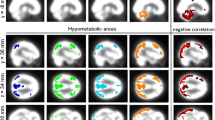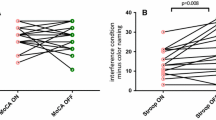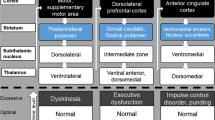Abstract
The responsibility of cerebral cholinergic lesions for the weak clinical response to cholinergic neurotransmission enhancement of Alzheimer’s disease (AD) was studied by measuring the effects of physostigmine on glucose consumption and neuropsychological tests. Ten AD and ten aged normals (AN) were examined twice, under placebo and under maximal tolerated dose of physostigmine, in randomized order and blind fashion. Under physostigmine, both groups showed better performances in tests measuring attention (P < 0.05–0.001) but not long-term memory, and cerebral glucose consumption was regionally modified (P < 0.0001). We observed a regional decrease in AD and in AN which was larger in AD, where each patient exhibited a mean metabolic decrease. With normalized values, AD and AN showed a similar decrease in the metabolic values of prefrontal cortex and striatum (P = 0.0003). These findings suggest that cholinergic neurotransmission enhancement depresses glucose consumption and increases selective attention in similar ways in both groups, but to a larger extent in AD. This suggests that brain metabolism in AD over-responds to enhancement of cholinergic neurotransmission. The observed weak response of clinical symptomatology to anticholinesterase agents does not appear to be due to the failure to enhance the activity of the cholinergic system in AD.
Similar content being viewed by others
Author information
Authors and Affiliations
Additional information
Received: 4 June 1997/Final version: 3 September 1997
Rights and permissions
About this article
Cite this article
Blin, J., Ivanoiu, A., De Volder, A. et al. Physostigmine results in an increased decrement in brain glucose consumption in Alzheimer’s disease. Psychopharmacology 136, 256–263 (1998). https://doi.org/10.1007/s002130050564
Issue Date:
DOI: https://doi.org/10.1007/s002130050564




